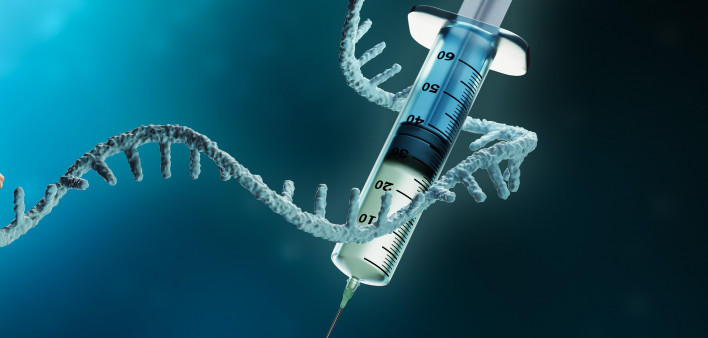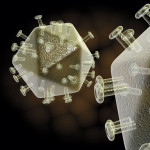A new clinical trial testing experimental HIV vaccines that use the same messenger RNA (mRNA) technology as highly effective COVID-19 vaccines is now underway. The three vaccine candidates deliver different versions of HIV spike proteins, which the virus uses to enter cells.
After more than three decades of research, scientists have made little headway developing vaccines to prevent HIV. The virus mutates rapidly, and there are many different strains around the world, making it difficult to develop broadly effective vaccines. But just as HIV vaccine research has helped lay the groundwork for successful COVID-19 vaccines, experts hope things will come full circle, and advances in mRNA technology will aid the quest for effective HIV vaccines.
“Finding an HIV vaccine has proven to be a daunting scientific challenge,” National Institute of Allergy and Infectious Diseases (NIAID) director Anthony Fauci, MD, said in a NIAID press release. “With the success of safe and highly effective COVID-19 vaccines, we have an exciting opportunity to learn whether mRNA technology can achieve similar results against HIV infection.”
In brief, mRNA vaccines deliver bits of genetic material that encode instructions for making proteins. The Moderna and Pfizer-BioNTech COVID-19 vaccines carry blueprints for making the SARS-CoV-2 spike protein. When the vaccine is injected into a muscle, cells produce the protein, which triggers an immune response. Likewise, the vaccines used in the new study deliver different trimer configurations of stabilized HIV spike proteins.
The Phase I HVTN 302 trial (NCT05217641), sponsored by NIAID, is testing three vaccine candidates known as BG505 MD39.3 mRNA, BG505 MD39.3 gp151 mRNA and BG505 MD39.3 gp151 CD4KO mRNA, to determine whether they are safe and can induce immune responses. The specific mRNA sequences in the vaccines were designed by researchers at the Scripps Consortium for HIV/AIDS Vaccine Development and the IAVI Neutralizing Antibody Center at Scripps, in collaboration with scientists at Moderna (which calls this vaccine approach mRNA-1574).
ANNOUNCEMENT ????: We are proud to announce that the first participant has been dosed in the Phase 1 study of mRNA-1574, our experimental human immunodeficiency virus (#HIV) trimer #mRNA #vaccine candidate. https://t.co/etMyVK1SoH pic.twitter.com/tNdwR8xZAK
— Moderna (@moderna_tx) March 14, 2022
The study, conducted by the HIV Vaccine Trials Network (HVTN) at the Fred Hutchinson Cancer Research Center, will enroll up to 108 HIV-negative adults at 11 sites in Birmingham, Boston, Los Angeles, New York City, Philadelphia, Pittsburgh, Rochester and Seattle. The first dozen volunteers have already been enrolled. Each participant will be randomly assigned to receive three doses of one of the experimental vaccines, with the first shot at their initial visit and subsequent doses given two and six months later. Blood and lymph node samples will be collected to assess immune responses.
While these experimental vaccines are themselves not expected to provide protection against HIV, the knowledge gained from this study will aid in the future development of a protective HIV vaccine regimen, according to an HVTN press release. Researchers hope to learn whether the vaccine candidates trigger production of neutralizing antibodies and T-cell responses that could fight HIV, as well as how immune responses induced by mRNA vaccines compare with responses to protein-based vaccines.
“This study will help us to gain a better understanding of how mRNA technology can be employed to help the body make HIV spike proteins in response to a vaccine,” William Schief, PhD, executive director of vaccine design at IAVI’s Neutralizing Antibody Center, commented. “The data we obtain will help guide design and clinical testing of a future HIV vaccine and hopefully will expand on the knowledge we have already gained using an mRNA vaccine for COVID-19.”
As recently reported, another Phase I trial, IAVI G002 (NCT05001373), is testing a different approach, known as germline targeting, which aims to train immature B cells in a stepwise fashion to produce broadly neutralizing antibodies (bnAbs) that target multiple strains of HIV. In an early study, a so-called immunogen consisting of engineered HIV envelope proteins triggered production of specialized B cells, the first step in the pathway for generating bnAbs.
IAVI G002 aims to enroll 56 HIV-negative adult volunteers. Most will receive one or two doses of a vaccine candidate dubbed eOD-GT8 60mer mRNA (also known as mRNA-1644). Some will also receive a booster called Core-g28v2 60mer mRNA (mRNA-1644v2-Core) while others will receive the booster alone. These vaccine candidates were also developed by researchers at Scripps Research in collaboration with IAVI and Moderna.
While both mRNA vaccine approaches hold promise, the research is still in early stages, and it will take years before the vaccine regimens can be evaluated in large clinical trials and—if successful—be deployed worldwide.
Click here for more news about HIV vaccines.
Click here for a POZ feature on HIV vaccine development.







Comments
Comments